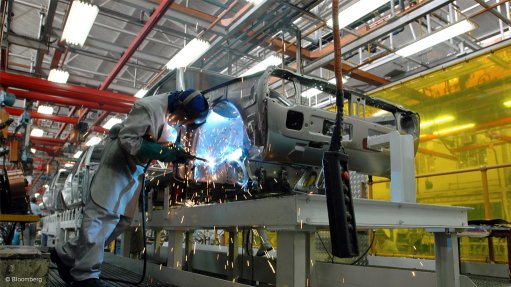
Photo by: Bloomberg
The seasonally adjusted Absa Purchasing Managers’ Index (PMI) has declined from a solid 51.5 points recorded in July to 43.4 in August – its lowest recorded level in 18 months.
The deterioration was driven by sharp declines in the new sales orders index, as well as the business activity index; however, inventories and supplier deliveries came in above the neutral 50-point mark in August, which provided some support to the headline PMI.
Overall, the average level of the PMI recorded during the first two months of the third quarter was 47.5.
“Despite a brief rebound in July, there was a significant dip in the data, reflecting the inability of purchasing executives to sustain momentum in business activity in the broader manufacturing sector.
“Unfortunately, the datapoint places the headline PMI below the 50-neutral level, which separates expansion from contraction,” Steel and Engineering Industries Federation of Southern Africa (Seifsa) economist Marique Kruger commented on Monday.
The decline in the new sales orders index seems to be driven by renewed weakness in domestic demand as respondents were more positive on exports compared with the previous month.
The deterioration in demand contributed to a fall in output, as reflected in a big decline in the business activity index. This, in turn, weighed on the employment index, which fell back below the neutral 50-point mark after a positive outcome in July.
“The significant declines in August are surprising as it is hard to imagine that the underlying economic conditions deteriorated as rapidly as reflected by the main PMI subcomponents.
“Strictly speaking, the PMI is not a sentiment indicator as it gauges activity levels, but the responses of purchasing managers may have been influenced by the further ratcheting up of the land debate during the past month,” Seifsa stated.
The PMI has also been fairly volatile in recent times. Therefore, at least another couple of readings are required before any strong conclusions can be drawn from this data, including whether the PMI’s move above 50 in July was a temporary blip.
Worryingly, purchasing managers turned even more downbeat about expected conditions going forward. The index tracking expected business conditions in six months’ time declined for a sixth consecutive month to reach 44.6 in August.
This is the lowest level since early 2016. The fact that a further deterioration is expected from the bleak picture of current conditions, as reflected by the August PMI survey, is very concerning, said Seifsa.
The PMI’s leading indicator also moved back below one, with inventories outstripping sales orders, which usually does not bode well for manufacturing output going forward.
Kruger said increasing fuel prices add to rising pressure on business input costs in the metals and engineering cluster and the broader manufacturing sector
“Further, businesses are constrained from being able to take advantage of the weaker exchange rate, thereby paying more for imported inputs. The double whammy of rising fuel prices and input costs has the potential to impact negatively on both production and exports volumes.”
However, Kruger added that Seifsa remained hopeful that businesses in the metals and engineering sector will take advantage of a slowly firming business sentiment, which is underpinned by improving political will, to continue boosting output levels and stay resilient.